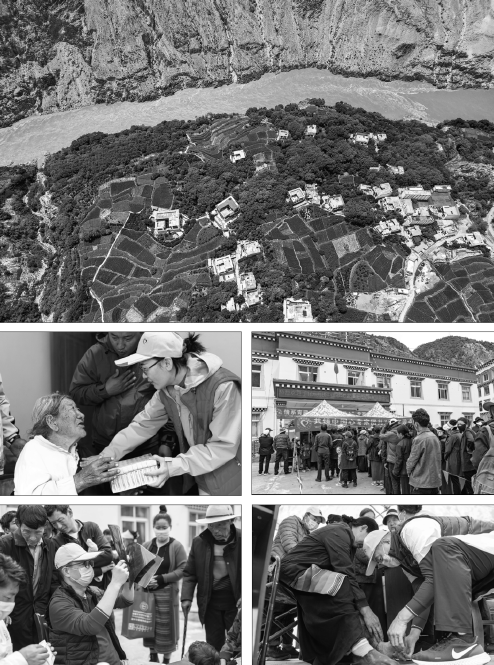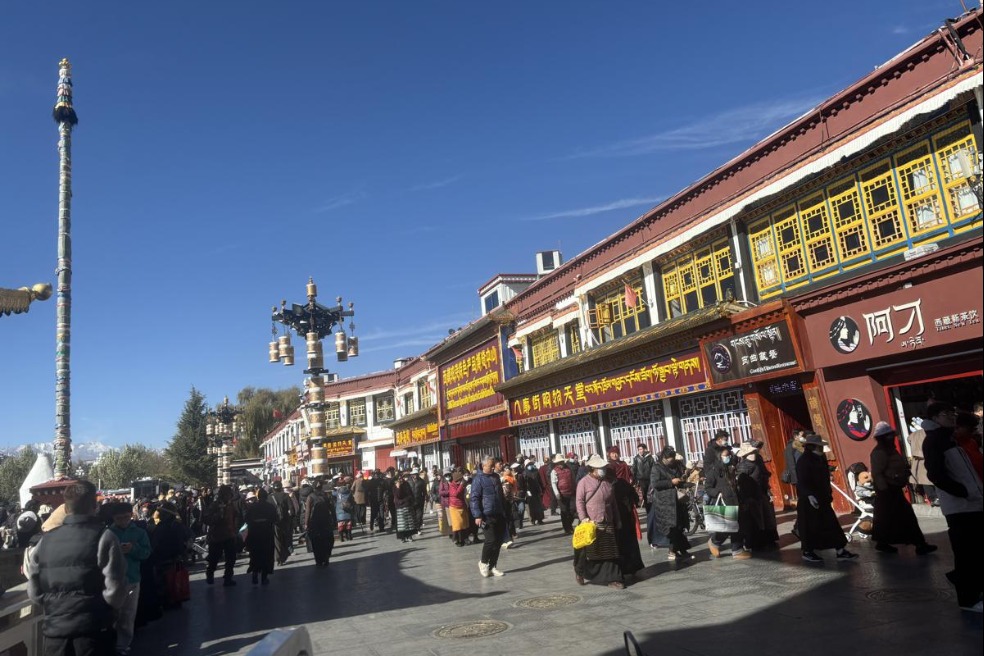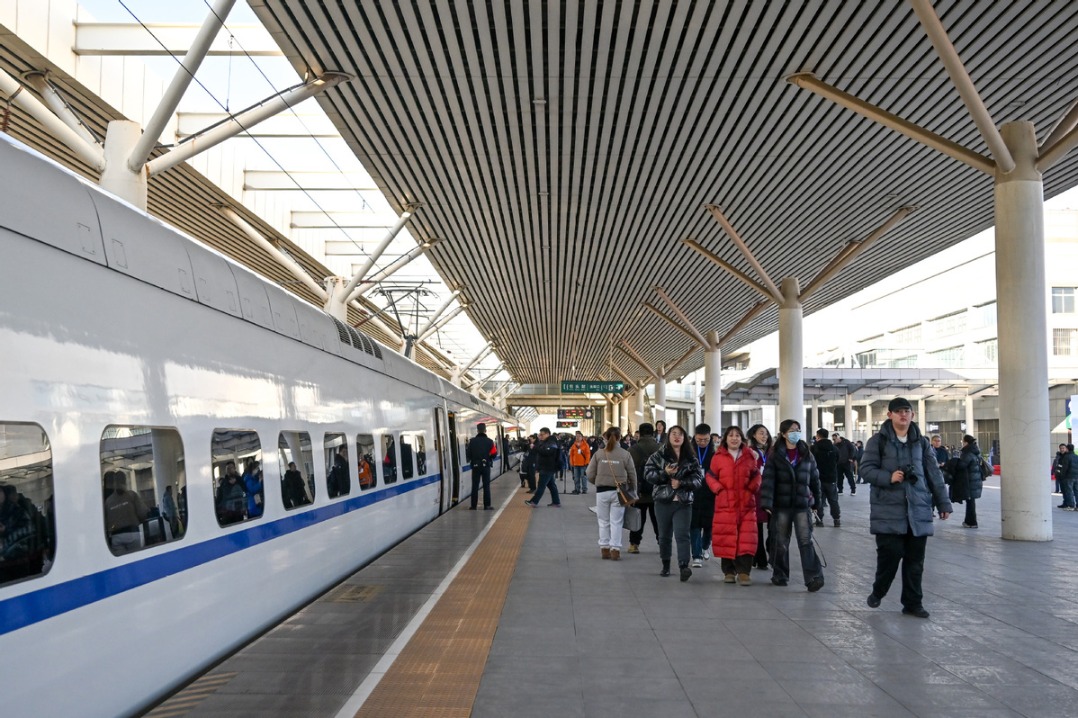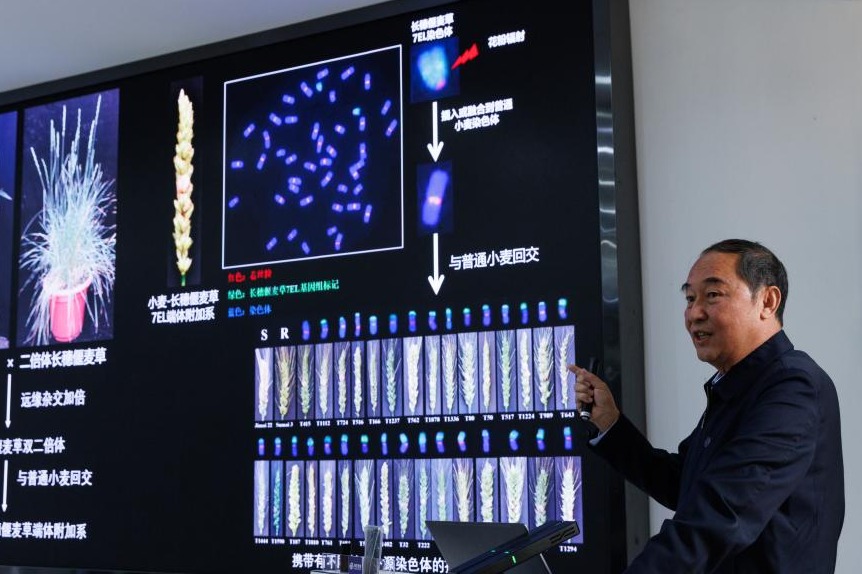Bringing hearts and minds
Public welfare program sees volunteer doctors visit medically ill-equipped rural areas to not only offer people free consultation and treatment, but also provide training and knowledge, Cheng Yuezhu reports.

This might have been one of the more bustling days for Chagyoi town, deep in the mountains of Zogang county, Chamdo, Tibet autonomous region.
At 9 o'clock in the morning, when medical experts from Beijing arrive at the town's health center, its front yard is already packed with villagers, who line up in front of the tables waiting for their turn to see the doctors.
One of them, Yeshe Nyima, lives in a village more than 30 kilometers away from the town. He got up at 6 am to bring his 59-year-old mother to see the doctors for a checkup for her chronic leg pain.
"I saw on the news that doctors from Beijing are coming to treat patients, and our village committee also informed us. I've never heard of such an event before, let alone attended one," he says.
"Usually, when we need to seek such treatment, we have to go to the county hospital. But this time, the experts came especially for us. Both diagnosis and medication are free. I'm very grateful."
The doctors were invited by the China Hearts program, a public welfare service first launched in 2008, which brings doctors from hospitals in major cities, primarily Beijing, to remote regions of China.
For the program's 2023 edition, a total of 453 medical experts and more than 100 volunteers arrived in Chamdo to provide local residents with free medical support including consultations, health checkups and treatment.
From July 7 to 14, the doctors and volunteers were divided into multiple teams and allocated to the city's 11 districts and counties.
Among them, a team of approximately 30 took a six-hour bus ride along mountain roads to Zogang county, an area that sits mostly at an altitude of around 4,000 meters.
According to Tashi Drolma, deputy head of Zogang county, the county has a total of 144 healthcare facilities, but there is only one county-level hospital and the vast majority of the rest are village clinics.
"Zogang county covers a vast area with a dispersed population. The medical infrastructure in the remote rural region is relatively weak compared to other counties or regions," she says.
Among the chronic diseases faced by residents of Zogang, mostly a farming and herding community, is chronic mountain sickness. This is exacerbated by the severe shortage of skilled professionals and organizations to train them.
Chagyoi's health center is one of the county's 10 health centers at the township level, but as the only one in the area, its patients come from both the local community and three neighboring towns.
Chosphel Tashi, Party secretary of Chagyoi, estimates that in the first half day, more than 300 people arrived at the center to attend the free medical consultations.
The town and its 33 villages have a population of more than 7,000, the majority of whom are members of the Tibetan ethnic group. Local people tend to suffer from coronary heart diseases and musculoskeletal disorders, common health issues found in high-altitude regions.
"They have been very much looking forward to the China Hearts medical team's arrival. Previously when they encountered complicated health problems, they had to take long journeys to cities or nearby provinces, where they might face many difficulties including making payments, traffic and language," he explains.
"I hope that we can have more events like this in the future. It's a very meaningful project, as it not only facilitates communication and integration among different ethnic groups, but also allows local residents to benefit from top-notch medical resources and enjoy more convenient medical support."
It's the fourth time that Li Yan, an attending physician of internal medicine at Beijing Renhe Hospital, has participated in the program.
"It was a matter of chance when I was first invited to the program, but after attending the first trip, I started to join them whenever I could. I genuinely want to follow the team deep into the rural regions and get to know the areas and their people," Li says.
Compared to the regions she went to during previous trips, she says that the living conditions and medical services in Zogang county are insufficient in comparison.
Apart from seeing patients, prescribing medicine and instructing them on the various things they need to pay attention to, the doctors also have the responsibility of providing training sessions for local medical staff and giving health lectures to local residents.
"Even if we just offer meager services, be it basic medical treatment or delivering medicine, the journeys are meaningful," Li says.
"We also really hope that this isn't a one-off trip. Now, with the internet, we can build connections with local medical workers and provide medical support when we return to Beijing. But I also hope that one day, I can come back here as a volunteer once again."
Tashi Drolma expresses a similar hope that via this public welfare program, a sustainable collaborative scheme can be established between doctors from Beijing hospitals and Zogang.
For example, the doctors will help the county train their medical practitioners, either online or in situ, so as to help them acquire clinical proficiency and enhance their medical services.
In the meantime, Yu Huiyong, head of the Zogang medical team and a chief physician at the Beijing University of Chinese Medicine Third Affiliated Hospital, proposed that traditional Chinese medicine might offer an effective solution for improving medical services in rural areas.
"For these remote areas, where medical equipment is lacking, traditional Chinese medicine can play to its strengths, because we can tailor remedies according to the symptoms of patients," Yu says.
According to the program foundation, over the past 15 years, more than 20,000 medical experts from Beijing have been dispatched on 13 trips to the Qinghai-Tibet Plateau, offering medical support to over 500,000 local residents.
Around 100,000 people from various ethnic groups attended the program's 710 healthcare lectures, while more than 50,000 medical workers participated in professional training sessions, and over 1,500 children with congenital heart diseases received free surgery.
This year's consultation served more than 52,000 people, accounting for approximately 7 percent of Chamdo's total population. A total of 173 lectures and forums were hosted, and medications and medical supplies worth 21 million yuan ($2.92 million) were distributed.

Today's Top News
- Effective use of investment emphasized
- China's shuttle diplomacy strives to reach ceasefire
- Nanjing Museum's handling of donated art, relics being probed
- Key role of central SOEs emphasized
- New travel program hailed as 'milestone'
- Animated films top draw at box office






























